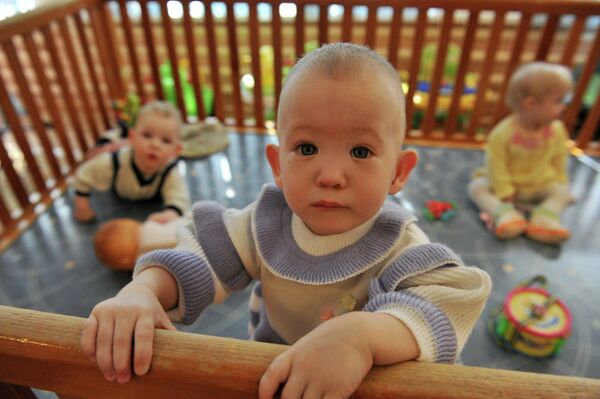This story has been substantively changed. Read updated story here.
MOSCOW, January 10 (RIA Novosti) – The existing bilateral adoption agreement between Russia and the United States will remain valid until early January 2014, President Vladimir Putin’s spokesman Dmitry Peskov said on Thursday.
“The agreement is in force at the moment,” Peskov told RIA Novosti. “It will be in force over the course of the year.”
It was not immediately clear whether Peskov's statement means the adoptions of 46 Russian children by US families currently underway will be allowed to proceed, or whether any new adoptions not yet being processed will be allowed during 2013.
According to Peskov, the agreement will be annulled in early January 2014. The adoption document states that “the agreement is valid over one year beginning from the date one party informs the other via diplomatic channels about its intention to withdraw from the present agreement.”
The adoption ban, signed by Putin on December 28, 2012, is part of Russia’s response to the US Magnitsky Act, signed into law by US President Barack Obama earlier in December. The act introduced sanctions against Russian officials suspected of human rights abuses and was named after Sergei Magnitsky, a whistleblowing lawyer who died in a Moscow pre-trial detention center in 2009.
The US State Department called the adoption ban “politically motivated.” While slightly more than half of Russians support the ban, according to one major pollster, critics say it would keep many children, including those with disabilities, in Russia’s orphanage system. According to US figures, more than 60,000 Russian children have been adopted by American families in the last 20 years, including 962 last year. Russian officials complain they have not been granted access to monitor the wellbeing of adopted children and blame US adoptive parents for the deaths of at least 19 of them.
The new law is named for Dima Yakovlev (whose American name was Chase Harrison), a Russian toddler who died of heatstroke in 2008 after his American adoptive father left him in a car for hours.
A number of high-level Russian officials, including Foreign Minister Sergei Lavrov, have criticized the adoption ban. While the measure is the most controversial aspect of the new law, the law included other retaliatory measures as well, such as banning alleged US abusers of Russian citizens’ rights from entering Russia and freezing any assets they may have here.
Updated with background; headline modified.


